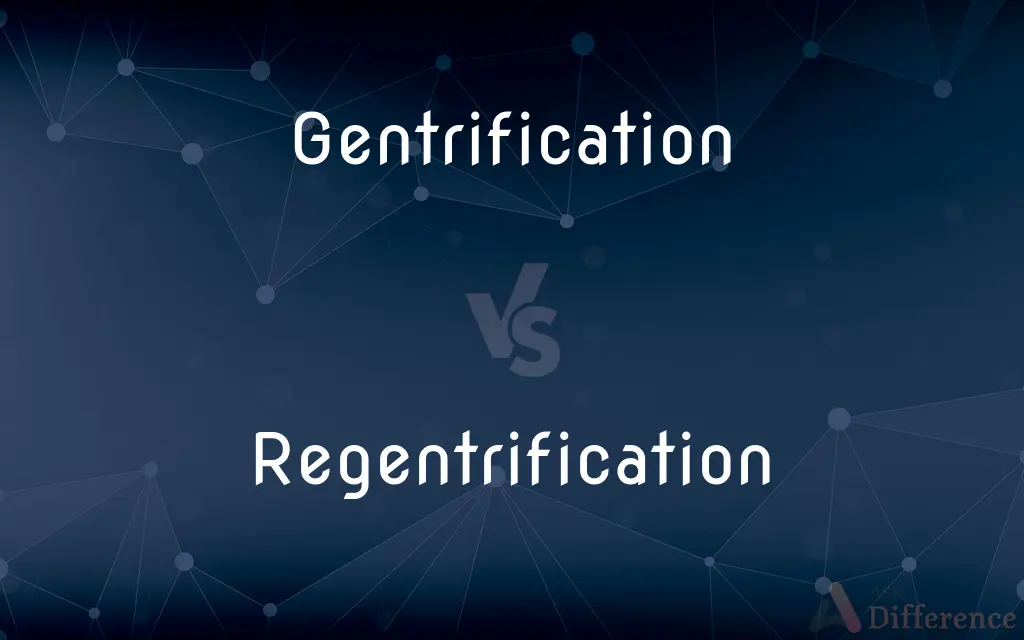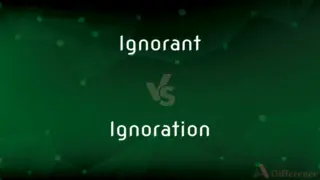Gentrification vs. Regentrification — What's the Difference?
By Tayyaba Rehman — Updated on August 18, 2023
Gentrification is the transformation of a neighborhood through the influx of wealthier residents, raising property values. Regentrification refers to the renewal or revival of previously gentrified areas.

Difference Between Gentrification and Regentrification
Table of Contents
ADVERTISEMENT
Key Differences
Gentrification is a socio-economic process wherein an urban neighborhood experiences an influx of wealthier residents, leading to increased property values and displacing lower-income families and small businesses. Regentrification, on the other hand, isn't as broadly established in urban studies. When referred to, it suggests a revival or re-establishment of gentrified areas.
Gentrification often starts with artists or young professionals seeking cheaper rents, transforming the vibe and culture of a neighborhood. As the area becomes trendy, businesses and wealthier residents move in. Regentrification may be seen as a second wave or repeated cycle of this phenomenon, focusing on areas that were once gentrified and have since seen some decline.
A significant concern with gentrification is that it can lead to the displacement of long-term residents who can't afford rising living costs. This changes the neighborhood's cultural fabric. Regentrification, while not extensively researched, might imply a further deepening of such socio-economic changes or might represent attempts to bring back original community characteristics.
Gentrification can bring both positive and negative impacts. Positive aspects may include decreased crime rates and improved infrastructure. Yet, the loss of cultural heritage and affordable housing options are pressing issues. In discussions of regentrification, these dual impacts might be re-emphasized, possibly reflecting on how neighborhoods can evolve cyclically.
While gentrification is a widely debated and studied concept with clear socio-economic implications, regentrification remains less understood. Both concepts, however, underscore the dynamic nature of urban neighborhoods and the challenges of preserving community identity amidst change.
ADVERTISEMENT
Comparison Chart
Definition
Renewal of urban areas by wealthier individuals.
Renewal of previously gentrified areas.
Impact on original residents
Often leads to displacement.
Could reinforce previous displacement.
Economic implication
Raises property values & rents.
Possible re-escalation of property values.
Cultural effects
Potential loss of original neighborhood culture.
Further erosion or an attempt to restore originality.
Prevalence in literature
Widely studied and debated.
Less commonly discussed.
Compare with Definitions
Gentrification
Urban renewal that leads to the migration of affluent individuals into deteriorating neighborhoods.
The waterfront area's gentrification transformed it from a forgotten dockyard to a vibrant hub.
Regentrification
The phenomenon of areas oscillating between gentrification, decline, and subsequent revival.
The marketplace, once a hub, then a ghost town, is bustling again due to regentrification.
Gentrification
The process where poorer urban areas see an influx of middle-class or affluent people.
The old factory district is undergoing gentrification with new coffee shops and art galleries.
Regentrification
A secondary phase of urban renewal focused on areas already influenced by gentrification.
Downtown, after its initial boom, is now seeing regentrification bring new changes.
Gentrification
An urban transformation marked by rising property values and the displacement of lower-income residents.
The introduction of upscale stores and apartments indicated the gentrification of the downtown area.
Regentrification
The process of revitalizing areas that once experienced gentrification but later declined.
The district, after facing a decade of stagnation, is undergoing regentrification.
Gentrification
The socio-economic shift in an urban community toward wealthier residents and businesses.
Many residents had to move out due to gentrification pushing up the rent.
Regentrification
The renewal or further gentrifying impact on neighborhoods that had previously undergone gentrification.
After its golden years and subsequent decline, regentrification is breathing new life into the suburb.
Gentrification
The revitalization of neighborhoods which often results in the ousting of its long-term inhabitants.
The historic neighborhood, once neglected, now bustles with life thanks to gentrification.
Regentrification
The repeated cycle of gentrification in a previously gentrified area.
The old town has seen regentrification, with a new wave of artists settling in.
Gentrification
Gentrification is the process of changing the character of a neighborhood through the influx of more affluent residents and businesses. Because it tends to change the character of said neighborhood, it is a common and controversial topic in politics and in urban planning.
Regentrification
The act or process of regentrifying.
Gentrification
The restoration and upgrading of deteriorated urban property by middle-class or affluent people, often resulting in displacement of lower-income people.
Gentrification
The process of renovating and improving a house or district so that it conforms to middle-class taste
An area undergoing rapid gentrification
Gentrification
(urban studies) The renewal and rebuilding that accompanies the influx of middle class or affluent people into deteriorating areas and often displaces earlier, usually poorer, residents; any example of such a process.
Gentrification
The restoration of run-down urban areas by the middle class (resulting in the displacement of lower-income people)
Common Curiosities
How does gentrification impact original residents?
Gentrification often leads to rising living costs, making it difficult for original residents to afford their homes, resulting in displacement.
Is regentrification a widely recognized concept?
No, regentrification is not as established as gentrification in urban studies, but when mentioned, it usually denotes a renewal of previously gentrified areas.
What is gentrification?
Gentrification is the socio-economic transformation of urban neighborhoods, where wealthier individuals move in, often leading to increased property values and displacement of original residents.
What starts the process of gentrification?
Often, gentrification begins with artists or young professionals seeking affordable rents, subsequently changing the neighborhood's culture and attracting wealthier residents.
What does regentrification imply?
Regentrification, though less defined, typically refers to the revival or re-gentrification of areas that had previously experienced gentrification.
Why is gentrification seen as controversial?
While gentrification can bring about improved infrastructure and safety, it often displaces long-term residents and changes the cultural essence of a neighborhood.
Can regentrification restore original neighborhood culture?
The concept of regentrification isn't comprehensive enough to conclude this, but it might either indicate further erosion or attempts to restore originality.
Is gentrification only about economic changes?
No, while gentrification has clear economic implications, it also involves cultural, social, and political dimensions.
Could regentrification be a repeated cycle of gentrification?
Yes, regentrification can be viewed as a repeated or secondary wave of gentrification in previously affected areas.
How does regentrification differ from simple urban renewal?
While both involve revitalization, regentrification specifically addresses areas that were previously gentrified and may have since seen some decline.
Share Your Discovery

Previous Comparison
Singlet vs. Vest
Next Comparison
Ignorant vs. IgnorationAuthor Spotlight
Written by
Tayyaba RehmanTayyaba Rehman is a distinguished writer, currently serving as a primary contributor to askdifference.com. As a researcher in semantics and etymology, Tayyaba's passion for the complexity of languages and their distinctions has found a perfect home on the platform. Tayyaba delves into the intricacies of language, distinguishing between commonly confused words and phrases, thereby providing clarity for readers worldwide.














































